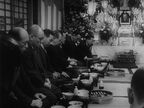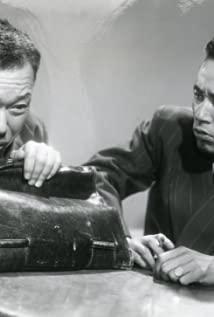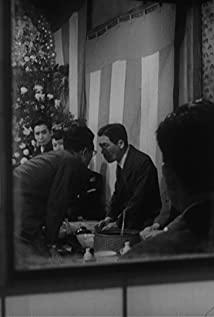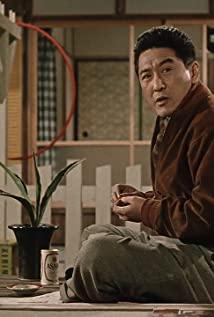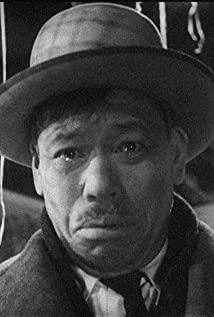Don't laugh at this old-fashioned slogan, there is no petty bourgeoisie. This is not a romantic, petty bourgeoisie movie.
At the beginning of the movie, nearly ten departments of the municipal government responded to residents' complaints about sewage issues, which seemed to be legitimate and reasonable, "should be handled by other departments", which made me feel "kind". I hate the practices of the above-mentioned departments, and the scenes of bureaucracy reflected in the film are still happening more than 50 years later in China, a foreign land relative to the film.
At work, 30 years are the same as one day, reading documents, stamping official seals, not being late, not leaving early, doing things carefully and not crossing the line, but refusing to blame in every way when people complain; I work hard for my son, but I can't get my son's closeness. Watanabe, the protagonist of the film, is such a small leader of a government department, an old man who lives in a closed and dull life. If nothing special happens, the days will continue to pile up like stagnant water. The body is alive, but the heart is dead, as Watanabe ripped the cover of the dusty plan "How to Improve Office Efficiency" (shocks my heart!) in the drawer to wipe the pen, and the narration of the film pointed it out mercilessly.
It's so lifelike. Can we see such people at work? Maybe the problem is not so serious, but they are generally people in this way? In the plainness of the film, there is a bit of bitterness that makes my heart cold.
What motivates you to work? Today, we are young, courageous, assertive, proactive, and enterprising. If we are put into the kind of work environment in the movie for a few years, will we be like Watanabe, as long as we don’t make mistakes, as long as we can Is it all right to keep the job? We cannot work purely for ideals or simply for survival; when we work, it is impossible to completely obey the environment, and it is impossible not to change ourselves completely; then, if we encounter an unfavorable environment, how can we be stable? Can the heart of the horns be guaranteed not to become smooth under the blow of the Axe of Time? So, when I saw Watanabe's old-fashioned, unchanging look throughout the day, I really got chills in my heart.
Watanabe's heart was already numb, but the diagnosis of advanced gastric cancer caused waves of stagnant water. The ruthlessness of his sons and daughters is another poison that numbs him. When he was extremely fearful and helpless, he inadvertently heard the ruthless words of his son and daughter-in-law. In desperation, he had the desire to be reborn and the impulse to break through himself.
On the other hand, when people are frustrated and desperate, it is easy to use the excuse of liberation to let themselves fall into another quagmire, but they can only sink deeper and deeper. The vulgar novelist wisely compares himself to the devil, and Watanabe cannot become a Faust. The movie portrays this very realistically. At first, under the guidance of the vulgar novelist, Watanabe sought pleasure in bars and nightclubs, but he did not exchange for the peace and fullness of his heart. Inadvertently became friends with the former female subordinate, and became dependent on getting along with this energetic young man, but it was only an anesthetic for the treatment of heart disease.
The desire to live? What exactly is it? Watanabe was at a loss for a while. In the conversation with the female subordinate, he was inspired by creation, and finally, he found the direction for the rest of his life.
Watanabe's direction is correct, he no longer anesthetizes himself with personal enjoyment, nor does he seek another job, but returns to his original position to change and create. Treating the sewage accumulated in a residential area over the years was originally his own approval of applications from other departments, but when he returned to work, he took this as the goal for the rest of his life.
At this point, the progress of the movie transitioned to Watanabe's death. Why is the desire to live so quickly approaching death? Is the rhythm of the movie so unsustainable?
Akira Kurosawa did not disappoint.
Next, the memories and arguments of his colleagues and superiors at the memorial ceremony gave me a deeper understanding of the film.
This is not a film that only writes about individuals - even if it only writes about Watanabe, it would be a good show - in addition to the ethical family, the philosophical thinking of life and death, the focus of the film is indeed on the value of life and the meaning of work. Reflection, therefore, Watanabe's death is not the end of the film. At the end of the film, the appearance and performance of that group of people is the most exciting part!
Wonderful, so wonderful. The vice mayor's arrogance, the flattery of his subordinates, and the fact that they don't mention Watanabe, the real promoter of the park's completion, all seem so indifferent. In the recollection of the difficult process of promoting the park construction plan step by step, in the analysis of the reasons for Watanabe's great change in temperament, Watanabe's last five months of life were proactive and selfless, and he was even not afraid of contradicting his boss for insisting on his ideals. His image was gradually and correctly outlined by his colleagues, which made them admire Watanabe, hate the scum-like working conditions and the stagnant water-like environment, and even vowed to change and forge ahead in the future!
I am relieved to see this. Why do you feel this way? Maybe, I have a kind of struggle and worry in my heart about my future work status, and I can get self-refinement and self-forgiveness when I see those who are as bad as "scumbags", and I have confidence in the future. Yes, everyone is happy.
In this film, "birth" never refers to the state of the body, and the desire to "live" is not simply to live. That is the pursuit of spiritual awakening and soul flashing. Watanabe finally found his desire to "live" and was reborn. Have his colleagues really found it too? Are you really happy?
no.
The former subordinate took over Watanabe's post, and when he received a complaint about the leakage of the drain pipe, he calmly said without hesitation, "This is managed by the ## department, and transferred to the ## department" - the same as the backwater of the year. Edges are the same. A passionate subordinate who had witnessed his colleague's "repentance" at Watanabe's funeral stood up in anger. He was so disappointed that he had no choice but to sit down under the surprised eyes of his colleague. In the end, he leaned on the bridge and looked down at the children who were having fun in the park built by Watanabe. How ironic, how shocking!
This is the "perfect" ending. The dead are reborn, and those who continue to be born are still dead! The desire to live in the past was just a flash in the pan after being drunk. Is stagnant water so hard to stir? Does the flame of spiritual rebirth really burn only when the body faces death? Could it be that understanding the truth must be accompanied by regretting the past?
Civil servants, come and see "The Desire of Life". All other young people who are not civil servants, come and see "The Desire of Life"!
View more about Ikiru reviews




